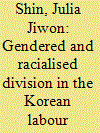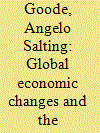|
|
|
Sort Order |
|
|
|
Items / Page
|
|
|
|
|
|
|
| Srl | Item |
| 1 |
ID:
089197


|
|
|
|
|
| Publication |
2009.
|
| Summary/Abstract |
Chinese family enterprises in the United Kingdom have penetrated many different sectors of the economy, including restaurants, wholesaling, retailing, trading, manufacturing, property development, computer services and investment holding. Among the companies in these sectors, those involved in different segments of the food industry, as manufacturers, retailers and wholesalers, reputedly feature characteristics of Chinese culture. A majority of these enterprises, for example, function as family firms. This study explores the assertion that, among companies owned by ethnic minorities, culture strongly influences form of business development. This argument will be assessed through a focus on Chinese food-based enterprises in the UK. Two family-controlled companies, Seven Seas (Frozen Food) Ltd and Dayat Foods Packaging Ltd, were selected as case studies as they are involved in key business components of the Chinese food chain industry. Through an in-depth comparative study of the history and development of these two firms, we consider the argument that Chinese businesses have evolved well because of family ties and their inclusion in mutually-beneficial ethnically-constructed networks. Through these case studies, we provide an alternative perspective to diasporic Chinese business development which brings into question the extensive use of the concept of ethnic enterprise.
|
|
|
|
|
|
|
|
|
|
|
|
|
|
|
|
| 2 |
ID:
089195


|
|
|
|
|
| Publication |
2009.
|
| Summary/Abstract |
Based on the empirical analysis of migrant women employed in the catering sector, this paper examines the gendered and racialised division in the Korean labour market. Given limited labour protection and the flexibilisation of the migrant workforce in the labour market, South Korea has been able to reduce possible economic and social costs and, at the same time, enjoy the benefits of the significant economic contribution of migrant workers. By looking at gender relations and racial discrimination in the catering sector, and inconsistent government policies, this paper underlines that migrant women are marginalised in the labour market owing to their 'multiple vulnerability' as women, migrants and undocumented workers.
|
|
|
|
|
|
|
|
|
|
|
|
|
|
|
|
| 3 |
ID:
089196


|
|
|
|
|
| Publication |
2009.
|
| Summary/Abstract |
East Asia's economic prowess strongly impacted the research agenda of scholars studying the region. Whereas analysts had once focused on military governments, relations of dependency, clientelism, and low modes of peasant movements, they now investigate industrialisation. In East Asia, the Philippines is the largest contributor of migrant labourers to the global workforce. Following recent discussions by Robert Putnam on the social aspect of investment, perhaps human capital might then be considered part of the industrialisation process? Channelling human resources towards expediting industrialisation can be a catalyst for development. This article seeks to combine a variety of theoretical literatures with insights gained from conducting fieldwork and available empirical data, presenting its main findings in two major parts. The first focuses on the relationship between human capital, migration and economic growth, and suggests that social capital, particularly human resources, can help economic growth in developing countries if channelled appropriately. The second is a case study of the Philippines as the second largest exporter of human labour in the world, with human capital as its largest export commodity. A key feature of the research identifies the significance of commodifying human capital. The author argues that maximizing human resources, as a potential and un-channelled catalyst for improved economic growth is a good investment in social capital. By transforming human resources into a trade commodity, this economic transaction between labour-sending (parent) and labour-receiving (host) countries becomes a rational process that takes on emotional qualities, and must be considered where the trade of human labour is concerned.
|
|
|
|
|
|
|
|
|
|
|
|
|
|
|
|
|
|
|
|
|